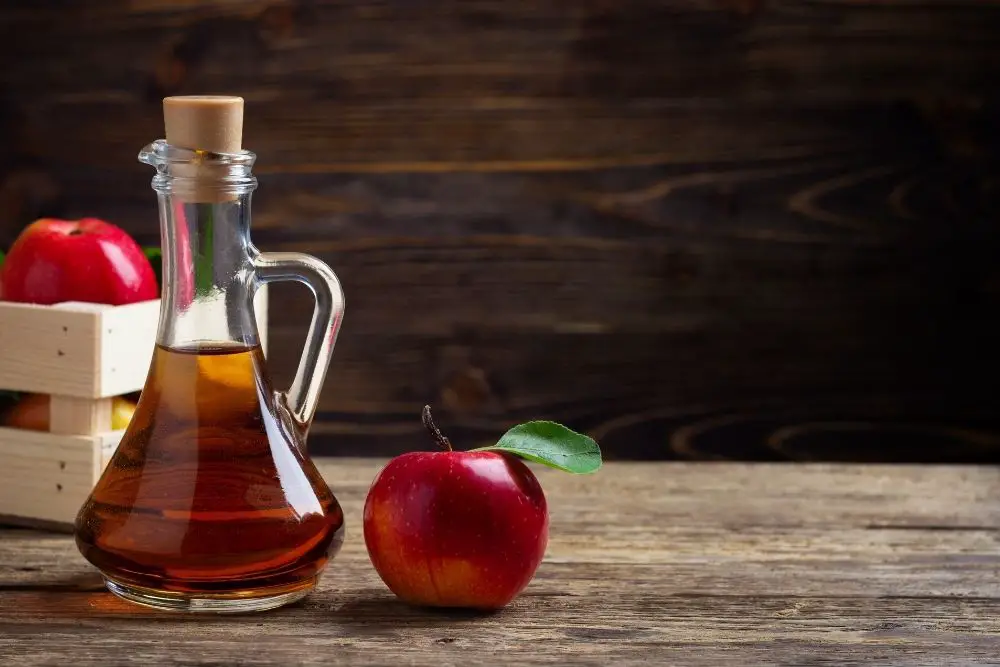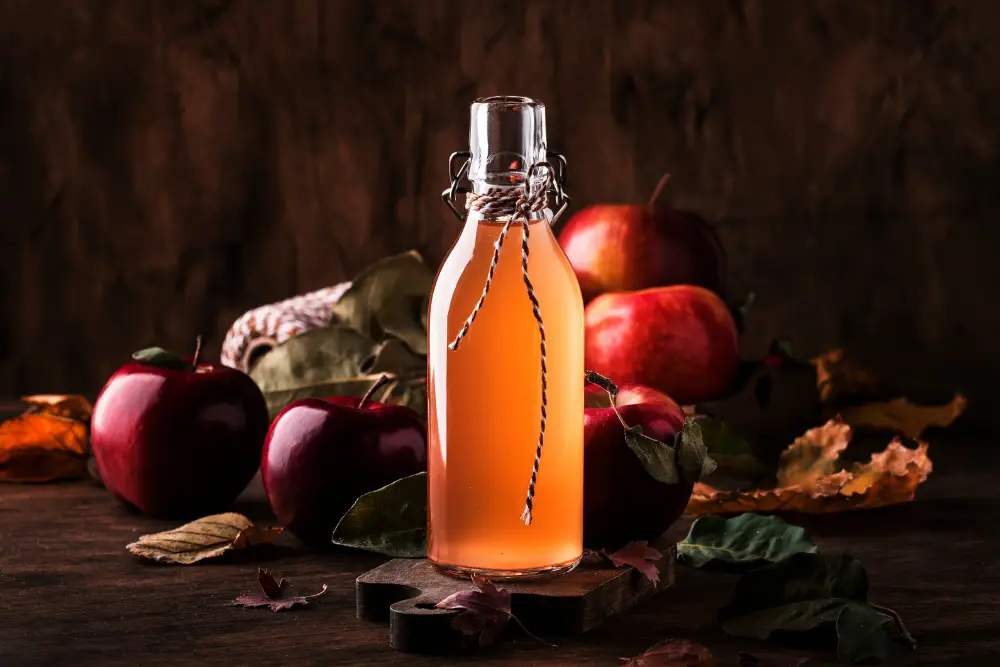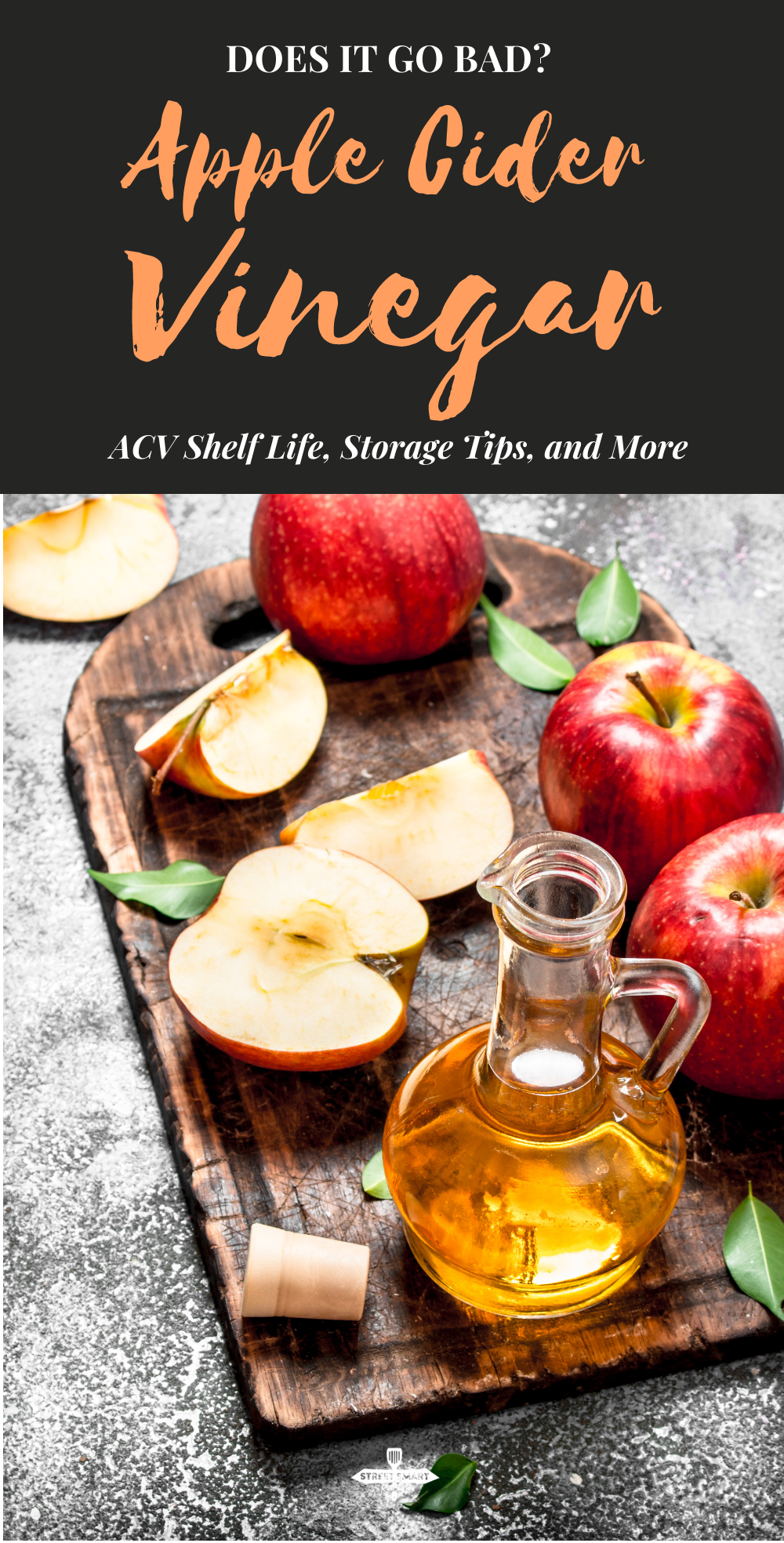Does Apple Cider Vinegar Go Bad? Shelf Life, Storage Tips, and More
Does apple cider vinegar go bad? With improper storage, yes, it does. Here are the shelf life of AVC and storage tips to keep it last longer.

Apple cider vinegar (or ACV) is a staple ingredient in any kitchen. White vinegar is pretty much relegated to life as a cleaning and pickling vinegar; Balsamic vinegar itself is an elegant dressing, and ACV is the star for recipes and other personal uses because of its numerous health benefits such as weight loss, fasting blood sugar reduction, etc. According to the Vinegar Institute, apple cider vinegar can also treat sunburn and relieve “morning” sickness for pregnant women.
The fermentation process of apple cider vinegar has two stages. First, apple juice from crushed apples is mixed with yeast to start alcoholic fermentation, which results in alcoholic apple cider. Next, the “mother of vinegar,” composed of acetic acid bacteria, is added to ferment the alcoholic apple cider and turn it into apple cider vinegar.
ACV comes in two versions: unfiltered and filtered. The unfiltered ACV has the mother, which gives it a cloudy appearance. It also contains good bacteria, so most people use it as a health tonic as well as for cooking (more on this below).
[thrive_leads id=’13056′]
The filtered and pasteurized version looks clearer and typically has a milder taste. Other than that, these varieties are interchangeable for salads and cooking, since they both have an acid level of five to six percent and a distinctive apple taste.
Apple cider vinegar is a versatile ingredient or condiment for health tonics, salad dressing, marinades, soups, sauces, and even mocktails. Now let’s take a look at the shelf life of apple cider vinegar, storage methods, and signs of spoilage of this kitchen necessity to reap its maximum benefits.
Does Apple Cider Vinegar Expire?
Yes, ACV can decline with improper storage like most vinegar products. It can also get contaminated when you use it as a skin toner in your bedroom or a part of vinaigrette in the kitchen if you treat the bottle carelessly.
Be careful while you’re handling the bottle to prevent introducing contaminants. Close it tightly after every use and observe proper hygiene (not touching the mouth of the bottle to anything, for example) and storage methods to make sure it’s safe to use for a long time.
The “best by” date or expiration date on the bottom of the bottle indicates when the flavor, consistency, and quality of the apple cider vinegar will likely start to degrade. It’s still safe to use after the date, but to enjoy it in its best quality, use the ACV within two to five years after opening.
What Are the Sediments in An Apple Cider Vinegar Bottle?

You might see a cloudy, slimy substance in your bottle of vinegar, and you may wonder if it’s time to throw the bottle away. Don’t worry—this completely harmless sediment is called the “mother of vinegar.” It consists of protein, enzymes, and good bacteria, which gives the vinegar a murky appearance.
Like virgin coconut oil, raw and unfiltered ACV is unrefined. It has the mother culture, so you know it’s real, all-natural and organic ACV. Raw ACV is unpasteurized: the beneficial probiotic bacteria are not killed by the heat of pasteurization. That’s why health experts who promote gut health recommend raw and unfiltered ACV.
If you’re bothered by the mother, simply disperse it by shaking the tightly closed bottle or strain the vinegar through a coffee filter before using it.
Are you using ACV only for cooking? Opt for the filtered version. It’s usually less expensive and has a milder taste.

How to Know If Apple Cider Vinegar Has Gone Bad
Contaminants may get inside your bottle of apple cider vinegar, which can cause spoilage. Here are the signs that it’s time to throw your stock away and purchase a new bottle.
- There are large amounts of sediments (that are not the mother) in the bottle.
- The vinegar smells rancid.
- The bottle lets out a hiss or fizz when opened.
- Contaminants have produced a lumpy texture of the vinegar.
How to Store Apple Cider Vinegar
The acidity of apple cider vinegar makes it self-preserving. It does not need refrigeration, even when opened. Its high acid content prevents bacteria and mold from thriving, so it’s safe to store it at room temperature. Of course, you still need to follow the proper storage guidelines so no contaminants can get inside the ACV bottle.
There’s no difference in storing your apple cider vinegar from any other types of vinegar. All you need to do are the following:
- Store it in a cool, dark place, like the kitchen cabinet or pantry, especially if the bottle is glass or clear plastic.
- Keep it away from heat or direct sunlight.
- Once opened, make sure to reseal it tightly after every use.
- If you’ll use ACV for beauty purposes in your bathroom—for your hair or skin—transfer an amount to dark spray bottles.
Now that you know how to keep your bottle of apple cider vinegar around longer, don’t just let it languish in your kitchen cupboard, the easiest way to incorporate AVC as a condiment in your diet is to add it to your salad veggies with a splash of olive oil, a pinch of salt and a few fresh grinds of black pepper.
For more ideas, check out these delicious recipes.
Authentic Filipino Pork Adobo | Slow Cooker Borscht Recipe (Shanghai-Style) | Beef Bone Broth | Southern Collard Greens | Homemade Chicken Broth, Bone Broth, and Vegetable Broth

[thrive_leads id=’13056′]
About the Author
Sharon Chen is an Integrative Nutrition Health Coach and author of the Complete Sous Vide Cookbook. She believes food not only brings healing but also connection. As the creator of StreetSmart Kitchen, she aims to make meal prep easier than ever and help you find balance, ease, joy, and simplicity in the kitchen as you improve your well-being.




Hi There Sharon!
I am interested in any ideas you might have for a natural liver detox program.
Thanks!
Matt